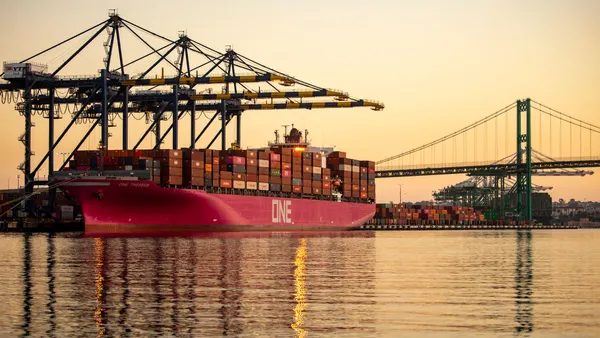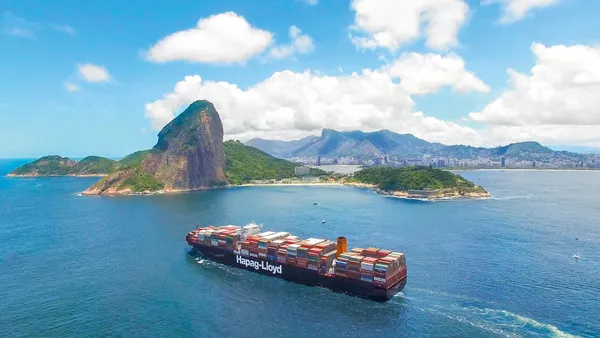Dive Brief:
- French container shipping line CMA CGM is seeking to halt booking cancellations on its Europe to Indian sub-continent, Gulf and Red Sea routes by enforcing a new fee, Seatrade Maritime News reported Tuesday.
- The levying of a cancellation fee is a direct result of recent numerous last-minute no-shows that left the line unable to fill empty cargo space. The $150 fee per TEU will commence June 1 and be charged to the booking party.
- Cancellations must be made at least 7 days in advance to avoid the fee. The routes affected are North Europe to the Red Sea, Middle East, India, Pakistan and Sri Lanka.
Dive Insight:
CMA CGM is not the first carrier to impose cancellation fees, but its per-TEU fee shows just how seriously carriers are looking to rid themselves of the industry problem.
In fact — along with larger ships, deeper ports and fewer calls — mutual cancellation fees may be the way of the future. In October, Hapag-Lloyd began assessing booking cancelation surcharges of roughly $40 per shipment (compared to $150 per TEU) in the ports of Hong Kong and Macau as a means of recouping lost revenue when TEU space goes unfulfilled, forcing a ship to travel undercapacity.
Shippers universally dislike the charge, arguing they are forced to book redundantly in order to avoid roll-overs by carriers. It's a chicken-and-the-egg problem: Carriers note they only roll-over because they are forced to overbook, in expectation of no-shows. These and more communication, transparency and contracting issues have led to a pervasive distrust between shippers and carriers.
So pervasive, in fact, a startup contracting platform was borne of the issue in March. The New York Shipping Exchange (NYSHEX) raised $8.5 million in funding to create a platform for shippers and carriers to engage in transparent, enforceable contracts and thereby increase mutual trust. To that end, the proposed platform's contracts include penalties of 40% of the agreed upon rate for shipper no-shows, and 35% for shipment roll-overs by carriers.
What is certain is that the current system of distrust and suspicion contributes nothing to an industry attempting to stabilize. Carriers are attempting to correct the structural waste through fees, while shippers demand greater transparency. While unfortunate, the increasingly common solution at least aims to reduce the industry's inefficiencies.














